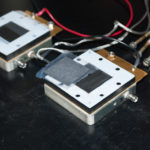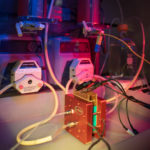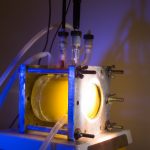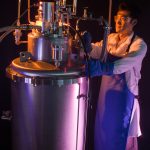The FSEC Energy Research Center at UCF conducts a wide range of research in hydrogen and fuel cell technologies.
Hydrogen and Fuel Cell Capabilities
The hydrogen and fuel cell capabilities at the FSEC® include fuel cells, and methanol electrolysis, solar-powered hydrogen production, hydrogen storage and purification.
Fuel Cells

A fuel cell converts the chemical energy in hydrogen and oxygen into direct current electrical energy by electrochemical reactions. Fuel cells are devices that convert hydrogen gas directly into low-voltage, direct current electricity. The process is essentially the reverse of the electrolytic method of splitting water into hydrogen and oxygen.
Learn More: Fuel Cells
Methanol Electrolysis
 Methanol is one of the chemicals suggested to be a promising, low-cost hydrogen carrier for its high energy density, ease of transportation, and lower risk compared to ammonia. To generate hydrogen at point of use, methanol needs to be converted into hydrogen, which can be done thermally via steam methane reforming (SMR) or electrochemically via electrolysis. UCF researchers collaborate with industry partners who produce low-carbon methanol from distributed sources, and investigate how impurities in crude methanol impact the performance of methanol electrolysis.
Methanol is one of the chemicals suggested to be a promising, low-cost hydrogen carrier for its high energy density, ease of transportation, and lower risk compared to ammonia. To generate hydrogen at point of use, methanol needs to be converted into hydrogen, which can be done thermally via steam methane reforming (SMR) or electrochemically via electrolysis. UCF researchers collaborate with industry partners who produce low-carbon methanol from distributed sources, and investigate how impurities in crude methanol impact the performance of methanol electrolysis.
Learn More: Methanol Electrolysis
Solar-Powered Hydrogen Production

UCF researchers have been conducting solar thermochemical hydrogen production since 2005. Solar-driven thermochemical water splitting cycles (TCWSCs) provide an energy-efficient and environmentally attractive method for generating hydrogen. Solar-powered TCWSCs utilize both thermal (i.e. high temperature heat) and light (i.e. quantum energy) components of the solar resource, thereby boosting the overall solar-to-hydrogen energy conversion efficiency compared to those with heat-only input.
Learn More: Solar-Powered Hydrogen Production
Hydrogen Storage and Purification
One of the biggest challenges for hydrogen fuel cell-powered vehicles is hydrogen storage. Several major auto manufactures have invested in cryogenic liquid hydrogen storage technologies in which hydrogen is cooled below its boiling temperature of -252.8 °C. Scientific communities worldwide have been actively searching for materials-based hydrogen storage methods due to potentially higher hydrogen gravimetric and volumetric density, moderate pressure and temperature requirements, controllable hydrogen release, easy storage and transportation, and simplified fueling.
Learn More: Hydrogen Storage and Purification
